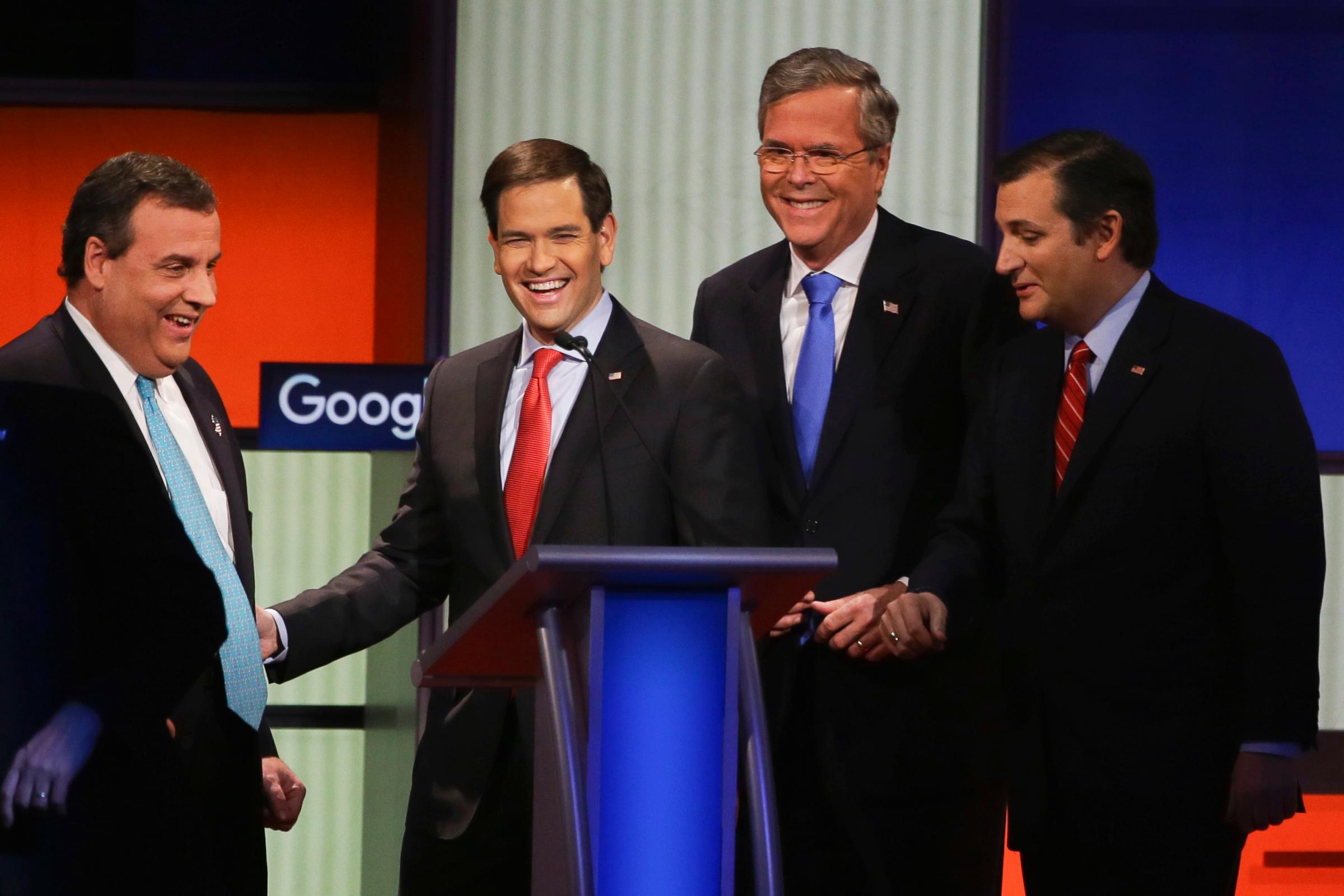For two whole hours Thursday night, the Republican Party awoke from its 2016 fever dream.
There was no Donald Trump on the Fox News stage in Des Moines, not in person or even in spirit. No schoolyard taunts, no outlandish promises to forcibly move 11 million people or block entire religions from entering airports. No grim tidings for America’s future, funny facial expressions or tough guy alpha talk.

It was as if the seventh Republican debate appeared suddenly, through a trick of time and space, from a doppelgänger universe, offering the country a fleeting glimpse of the election everyone expected a year ago.
In this alternate reality, little was surprising or shocking. The colors were dimmer, the tones more muted. Echoes arrived of debates in cycles past, replacing the reality show set pieces of 2015. The stage of seven split into the well-worn ruts of Republican politics, with Kentucky Sen. Rand Paul serenading the “Liberty voters,” Texas Sen. Ted Cruz playing to the pure-blood conservative base and a crowded pack of the party’s most accomplished establishment stars battling it out with skill and finesse for the crown of competency, experience and conviction.
The political amateur Ben Carson, a former brain surgeon prone to mumbles and non-sequitur, was also on stage. But he spoke rarely, with answers that creaked under his need to deliver facts like a high-school student presenting last night’s reading before class. No one showed a sign of paying him any mind.
With the regular cast and a regular script came debate exchanges that had been previously stomped on at past meetings by Trump’s outsize presence and the shock and awe it entails. A debate over immigration glossed the fantasies of a historic expulsion and a Mexico-financed wall to focus on the technical differences between a path to citizenship, a path to some other legal status or no path at all for the millions living in the country without legal documentation. The candidates threw consultant-crafted lines at each other as we have come to expect.
“Throughout this campaign, you’ve been willing to say or do anything in order to get votes,” Rubio told Cruz at one point, employing language that must have been employed, perhaps word-for-word, in every presidential election since Lyndon Johnson.
Read More: Republicans Echo Super PAC Ads in Debate Attacks
The contest of machismo gave way to debates over Senate votes and the word counts in amendments. Bush, who has previously found himself addled by the incivility of his opponent, was able to suppress his stutter and successfully deliver entire sentences from his campaign’s voluminous white papers. “I will make sure that we fire the sheer incompetence inside the Department of Veterans Affairs and then we’ll give veterans a choice card so that they don’t have to travel hours and hours to get care if they want to go to their private provider,” he said, in one impressive example.
Without using words like “great,” “so good” and “big league,” the contenders sorted themselves into the familiar lanes of Republican foreign policy, differing on the proper level of funding for the military and the degree of foreign ambition, but not on their resolve to keep the nation safe. Rand Paul even had space to return to his old appeal to broaden the party by reaching out to minority communities, decrying the municipal oppression of the black residents of Ferguson, Missiouri, before their city erupted in fury.
“The war on drugs has disproportionately affected our African-American community, and what we need to do is make sure that the war on drugs is equal protection under the law and that we don’t unfairly incarcerate another generation of young African-American males,” he said.
If there was a person who struggled under the new format, it was Cruz, who found himself for the first time without the shelter of Trump, and therefore unable to parry the same fury with a more mechanical, predictable, even Ivy League sheen that looked impressive in comparison. Instead, the Texas Senator spent the night playing defense, as the others attacked him for winning the Iowa polls.
Read More: Cruz Finds Himself in Crosshairs as Trump Skips Debate
For whole stretches, Cruz seemed to disappear, as if Fox News boss Roger Ailes was executing a well-worn plan to put him in his place. Then, at perhaps the most crucial moment of the debate, where body language matters as much as words, Cruz made a play to interrupt a Fox moderator, Chris Wallace, and bequest himself more time. Wallace, steely and confident, did not yield. Cruz, after awkward protestations, was forced to fold, appearing less than bold. When Cruz later whined about his treatment, Wallace pounced. “It is a debate, sir,” the moderator said, ice cold.
Of course, dreams have been known to appear within dreams, and reality often feels unreal. These are times when nothing should be taken at face value, especially when televised.
The truth of the seventh debate is that what took place on that stage over those two hours did not reflect the reality of either the Republican nomination fight or, at least for the moment, this country. That could be found a few miles away, where Trump had gathered his own multitudes at a separate venue in Des Moines, with his own network cameras, and a couple other candidates, in protest. The Republican frontrunner, rather than fading, has outgrown the circus he spoiled and set off on his own.
When the debate ended, the fever dream returned.
More Must-Reads from TIME
- Caitlin Clark Is TIME's 2024 Athlete of the Year
- Where Trump 2.0 Will Differ From 1.0
- Is Intermittent Fasting Good or Bad for You?
- The 100 Must-Read Books of 2024
- Column: If Optimism Feels Ridiculous Now, Try Hope
- The Future of Climate Action Is Trade Policy
- FX’s Say Nothing Is the Must-Watch Political Thriller of 2024
- Merle Bombardieri Is Helping People Make the Baby Decision
Contact us at letters@time.com